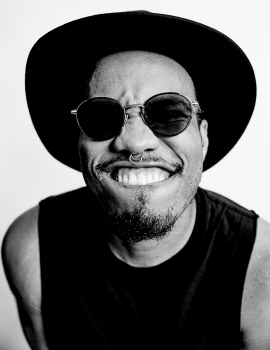Dillo Day 2016 featured artists who were particularly well-known within their respective communities and were up and coming mainstream artists. One of these artists was Anderson .Paak who prior to being picked up by Dr. Dre’s label Aftermath, went by Breezy Lovejoy. Anderson .Paak was born to a mixed race Korean and African-American mother who was an orphan as a result of the Korean War. Also he presents as black, Anderson .Paak performs the intersectionality of his blackness and Koreanness through his music.

Born Brandon Paak Anderson, the artist experienced a tumultuous childhood, experiencing the abuse of his mother and seeing both parents be incarcerated. However, he found refuge in playing music in the church, learning drums and eventually producing music. As he became more notable in the Los Angeles music scene, he went by the name Breezy Lovejoy and was mentored by Brian Lee who also is rapper Dumbfoundead’s manager. Lovejoy released several records under that name and eventually caught Dr. Dre’s attention and transitioned to Anderson .Paak. .Paak collaborated with various artists throughout his career however, some of his most salient collaborations have been with Korean/Korean-American artists including Dumbfounded, DEAN, and Tokimonsta. He started gaining traction in the mainstream media with the release of his EP ‘Malibu’ which was most recently nominated for a Grammy.
.Paak performs a radical politic in both his blackness and his Koreanness with his recent performance on the Grammys with A Tribe Called Quest, a performance which a strong political message of political resistance and as an anthem of hip hop. Along with his association with hip hop legends, his collaborations with Korean artists have been some of his most popular. His song with Korean producer and singer DEAN has received over 2 million plays on Spotify and his collaborations with Dumbfoundead contributed to his rise to fame.
In his song ‘The Waters’, .Paak raps “Residing pastor is thy .Paak and the first lady is a bad bitch with slanted eyes and a thick ass.” The intersectionality of his identities gives him the agency to reference both the “slanted eyes” and “thick ass” of his wife, representing both his Korean and black identities. .Paak is also uses Korean in referring to his wife in various interviews and about his Korean background, especially in discussing his his rise to fame. Although the rise of most artists is often a difficult time in many artists’ lives, it is particularly difficult for Asian-American artists. Oliver Wang writes in ‘Rapping and Repping Asian’, “the continued absence of Asian-American rappers within mainstream media contributes to the perception of their inauthenticity, which further hinders their chances of receiving commercial support.” Although .Paak is a quarter Korean, and is aware of that background, his blackness and more salient identity has given him agency in music that other Asian-Americans do not have because they are seen as inauthentic. Anderson .Paak has never specified whether or not he identifies as Asian-American or Korean-American, however, is that identity enough to make his identity as an artist less authentic?